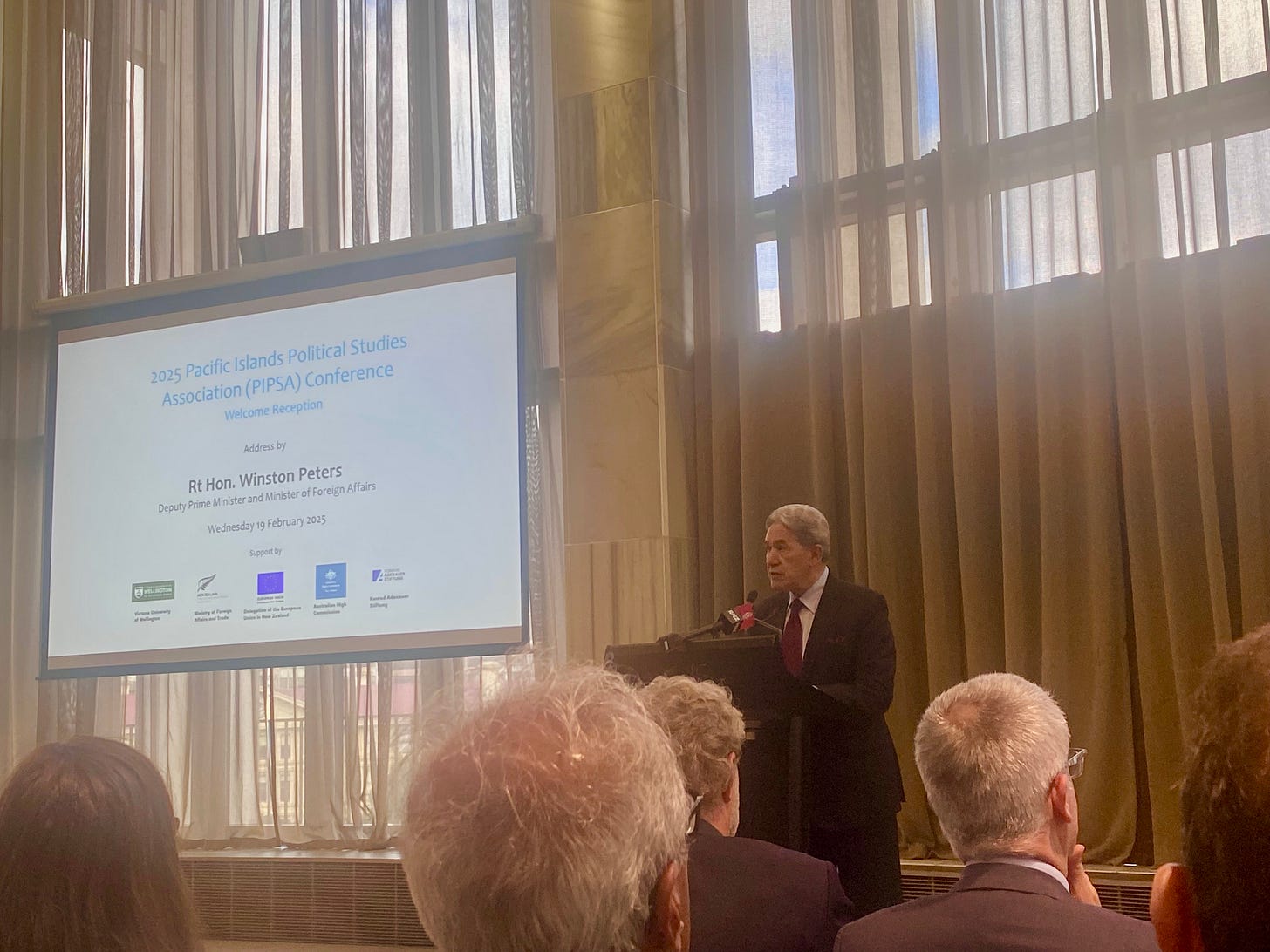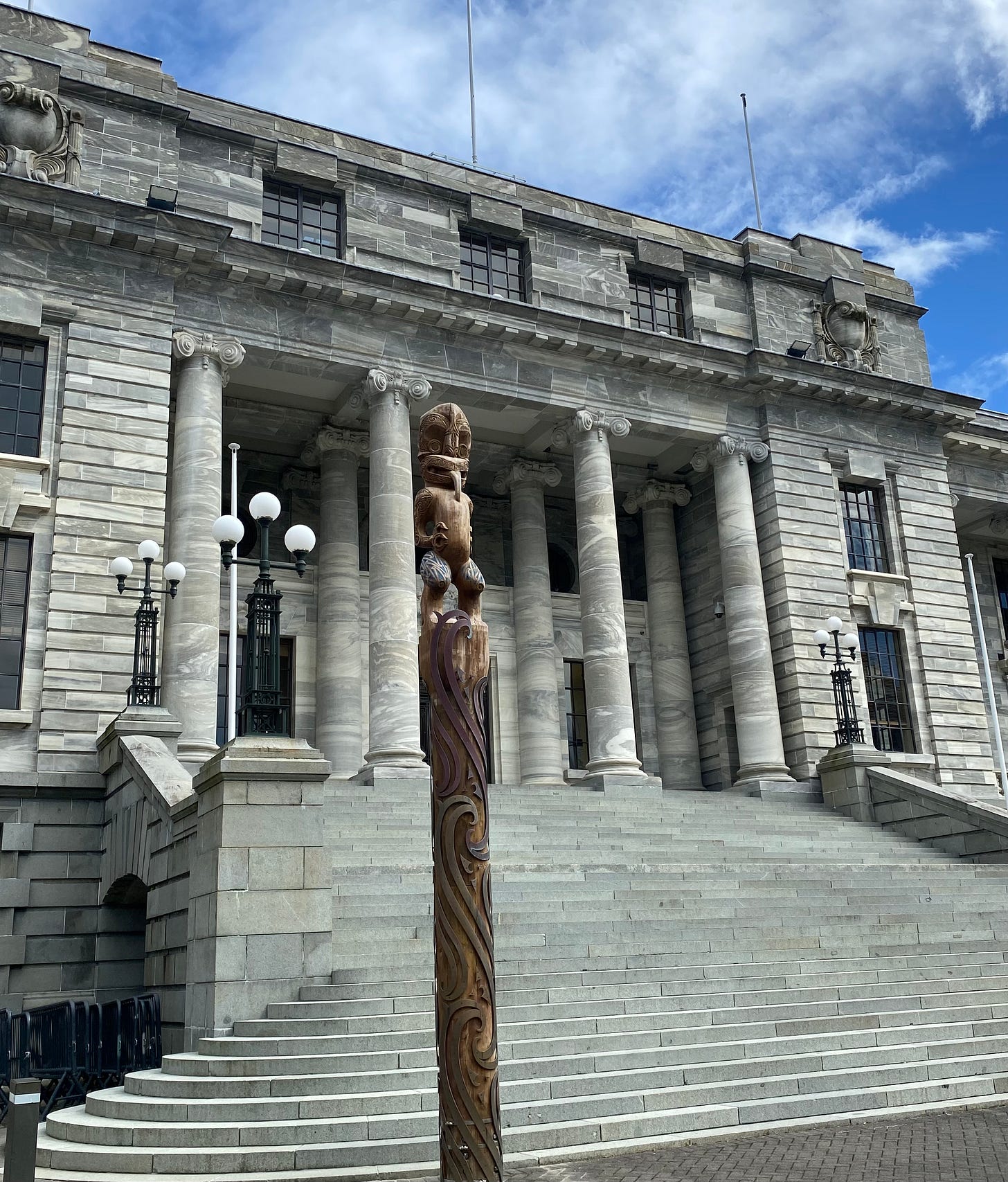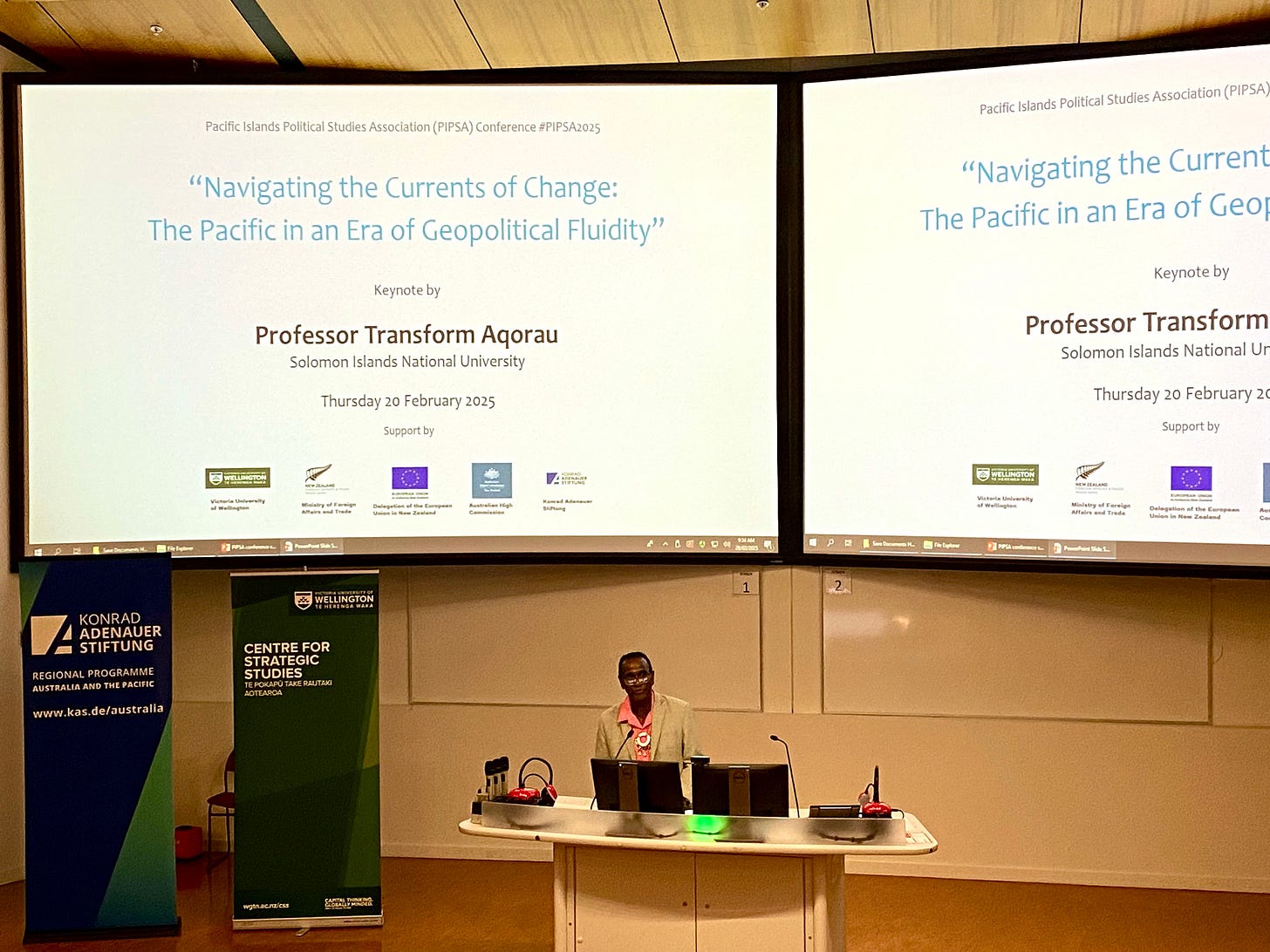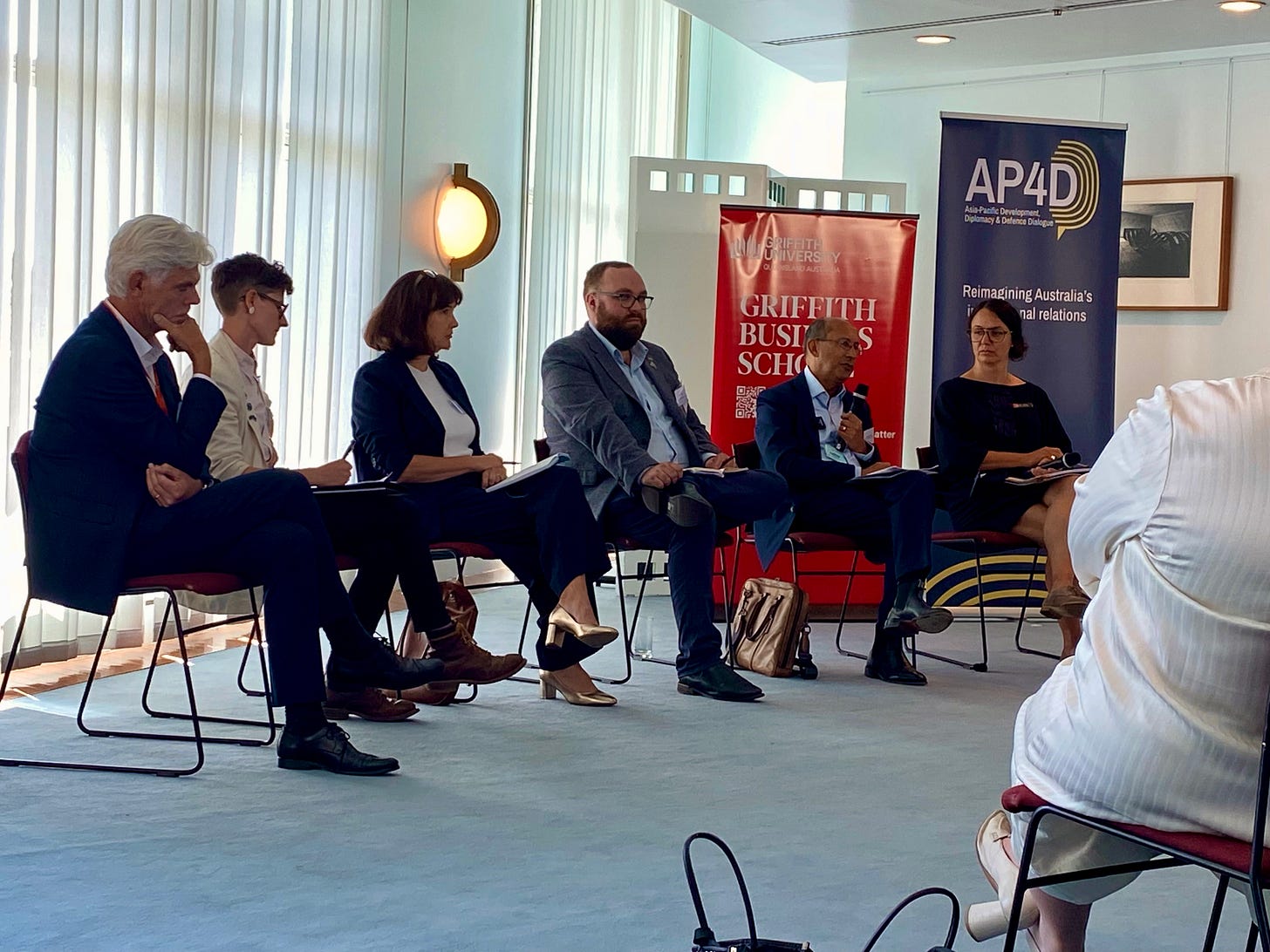Week 9: La diplomatie, grande et petite
A trip to Wellington for a Pacific Islands conference, admiring Canberra's public transport, and being the Swedish International Student Welcoming Committee.
Last week I popped across to Wellington for the Pacific Islands Political Studies Association (PIPSA) conference. I was there to present a paper for the organisation I work for – Asia-Pacific Development, Diplomacy and Defence Dialogue (AP4D) – on how Australia can enhance Pacific Regionalism.
The conference was opened at a reception at Parliament House by New Zealand’s deputy prime minister and foreign minister, Winston Peters. Peters is someone politely referred to as a “colourful character”, or less politely as “really fucking weird”.

Given the nature of NZ’s electoral system, over the past three decades Peters and his New Zealand First Party has often found themselves part of the governing coalition. As a result Peters is currently on his third stint as foreign minister. My guess is that foreign ministers in sensible countries1 are usually highly constrained by enduring state policies. There’s not a lot of room to freelance, and so within the role Peters can be kept on a tighter leash. Yet this doesn’t constrain his idiosyncrasies.
Despite being foreign minister three times – and therefore unable to claim ignorance – he refuses to pronounce the country of Kiribati properly, following the spelling rather than actual pronunciation (Kirr-i-bass). Aggrieved that spelling doesn’t reflect pronunciation it seems he’s decided to launch his own personal rebellion. To what end? Who knows? But Peters might try paying closer attention to the language he’s speaking in – one where spelling and pronunciation have no consistency whatsoever – before launching some petty linguistic assault on a small island country.
Peters’s other quirk – one that is even crazier – is that he refers to himself in the first person plural. Using our and we in place of my and I. This is known as the “majestic plural”, traditionally used by royalty to refer to themselves. Although Margaret Thatcher did once use the majestic plural, stating “we have become a grandmother” in 1989 upon the birth of her first grandchild. Presumably, Peters believes that the holders of the great offices of state should refer to themselves in this manner to give gravitas to their positions. But, again, very weird. And especially weird for antipodeans who usually shy away from such pomp and pretension.
Beyond getting a chuckle out of Peters, the PIPSA conference was also an excellent opportunity to meet and converse with many brilliant people from the region. Some of whom I had met via Zoom, but others who I only knew through their work. As well as be able to listen to excellent presentations of the latest research from throughout the Pacific region.
From Wellington, I made my way to Canberra. As on Monday we at AP4D were hosting an day-long event on Australian Diplomacy Today at Parliament House. The event covered the broad scope of diplomatic tools Australia has its disposal, with speakers advancing new and innovative ideas on how Australia can enhance its global relationships and build its influence. The day turned out to be a great success.
However, when I arrived in Canberra I had another objective. Without needing to be in a rush, I decided to figure out how to get to my hotel via public transport. I feel ashamed that I have never done this on previous visits to Canberra. My belief is that taxis should be the transport of absolute – unavoidable – last resort. And so I should have the integrity to be consistent with this belief.
Getting to my hotel involved both a bus and Canberra’s new tram (they call it “light rail”, but I’m never going to call it that). And this revealed two very interesting things to me.
The first is that the bus from Canberra airport is only a regular fare – that is, same as any other fare on the city’s public transport network. This is something I greatly respect, and cities like Helsinki that also do this should be constantly praised.
When – eventually – Melbourne gets its airport train, it is guaranteed to charge an airport surcharge, like Sydney does. Given that Tullamarine’s business model is effectively a car park with an airport as little side-earner, the owners of the airport will mostly likely have negotiated with the Victorian government to recoup some of its lost car parking revenue with inflated train ticket prices. It will be a further embarrassment to a city very keen on embarrassing itself.
The other thing I discovered on Canberra’s public transport is a further embarrassment to Melbourne – Canberra’s trams are good looking. Nice silhouettes, nice colour schemes, and great seating designs. The ugliness of Melbourne’s trams and trains is a permanent frustration to me – and consumes a lot of my brain activity. The city with the largest tram network in the world should take design very seriously. The network should be a massive soft power asset – with good design being essential to the city’s unique culture and identity, the way it projects an image to the world and enhancing its ability to attract the creative skills the city needs. As well as having some goddam self-respect. The Victorian government is oblivious to all this.

During the Australian Diplomacy Today conference Caitlyn Byrne from Griffith University, made the important point that international students are a critical component of Australia’s diplomatic outreach, and an essential tool for expanding Australia’s influence in the world.
Australia is, after all, not a country that people spend a lot of time thinking about. Therefore, seeding people out through the world who do have first-hand exposure to and knowledge of the country is incredibly important. And we all have a role to play in making sure that the experiences of people coming to Australia are positive and memorable.
Over the past several years I have been splitting my time between Melbourne and the southern Swedish town of Kristianstad. Due to this, I obviously have strong connections with the country, and am now an honorary Swede. Prior to leaving Melbourne for Kristianstad in mid-2022 some Swedish girls coming to study in Melbourne reached my inbox. I had planned to leave my flat empty while I was away, but this felt serendipitous. I met with them, they were amazing people, and I decided to let them stay at my place while I was in Sweden.
As this was my home, and not just some random flat I had to rent out – and that I would be leaving my possessions inside it – I needed to build trust with these girls. So the idea was cheap rent for high responsibility. It was concept that they immediately understood and took incredibly seriously. When I returned from Sweden the flat was in absolutely perfect condition and they’d left me some lovely gifts. But more than that, we’d formed a bond, and I now consider them part of my extended family. We maintain a little chat group, and whenever I’m in Stockholm I make sure to see them.
What has also flowed from this is that they now send onto me their friends who are also coming to study in Melbourne. And so I have found myself as the semi-official Swedish International Student Welcoming Committee. Which is a role I relish. I love being a tour guide, explaining how to get to places and delving into the city’s history for anyone who is interested in that stuff. Melbourne’s fondness for hiding its charms means that having someone with local knowledge is also handy for newcomers.
But I also feel a certain responsibility as an informal ambassador for the country (something we all are). And it gives me a sense of purpose and usefulness. I have an important and serious role to play here. As these are often youngsters the first time living out of home. They need someone to rely on in case of any problems.
One of these problems is the absurdity of finding accommodation in Melbourne at the moment. So I’m currently sleeping on the couch as I’ve taken in a pair of Swedes struggling to find a place. Which is fine. I pride myself on being impossible to inconvenience. I’ve slept in far worse places. The couch is a luxury.
But there is a larger issue to consider here. If Australia does see international students as an essential tool of its foreign policy then the current housing crisis is not helping at all. The objective should be for students to come and study in Australia, and then upon returning home talk constantly about how much they love Australia – as well as rise up to positions of influence within their countries and maintain strong connections to Australia. This simply will not happen if they cannot find the most basic thing they need – accommodation, which is of reasonable quality and affordably priced.
Governments in Australia (state and federal) are failing to recognise the seriousness of the problem here. It must be said the universities are also failing too – with student accommodation designed to fleece international students rather than provide them with quality and affordable housing to pursue their studies. This is particularly important because many students may only be in the country for a semester - 4 or 5 months - and landlords are often reluctant to sign such short leases.
Housing is the bedrock on which all other positive elements of humanity flow. Which makes the cost and scarcity of housing currently in Australia both a domestic and foreign policy catastrophe.
If the larger structures in Australia don’t understand the urgency of this problem then it’s up to humble citizens to step up, take the initiative, and extend their hospitality. So part of taking in a pair of Swedish students is picking up the diplomatic slack left by governments and major institutions. But I think it is also a recognition that we all have duties towards one another and we cannot rely on a belief that responsibility will be taken seriously by governments. Responsibility, literally, begins at home.
Acknowledging that we’re in an era of increasingly less sensible countries




